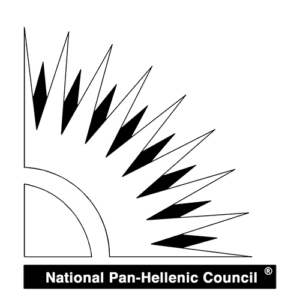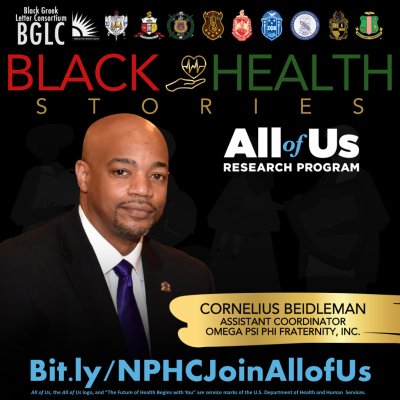Written by Cornelius Beidleman, Assistant Coordinator, Omega Psi Phi Fraternity, Inc.
Understanding my health is of the utmost importance to maintain a healthy lifestyle and living. I recognize that as I get older, my body and health composition will change. So, knowing my health numbers (blood pressure, cholesterol, weight, etc.) is a prerequisite to determining and guiding my next steps towards good health.
Armed with this information and a plan of action, I give myself a “lifesaving” gift each year. I visit my physician for an annual health assessment and openly discuss the results. During my doctor’s visit a physical exam is conducted to evaluate physical appearance, strength, pulse, auscultation of my heart and lungs, and blood pressure. A collection of blood work to review my metabolic condition also occurs.
Like many people, I have varied thoughts about the potential outcome of the test results, especially since I have a family history of High Blood Pressure. Before and during my doctor’s appointment, several questions come to mind: Am I okay? Is a year too long to get updates on my health-related numbers? Did I drink enough water? Have I exercised enough? Is the damage already done? And what are the consequences?
During my recent visit, it was determined that I have high blood pressure (Hypertension).
Note: Understanding my blood pressure is the first step in maintaining good health. After receiving this diagnosis, a new question arose. What do I do now?
I had a couple of options, which included medicine or better self-care to control my blood pressure. Although medication was an option, for me, it was a last resort. As much as I do not want to be placed on medication, I know that allowing my blood pressure to go untreated would not be responsible. Because neglect can cause other severe health issues, including heart disease and stroke. So, I concluded that if there were things that I could do to bring my numbers under control, I was committed to doing it.
I immediately jumped into high gear and committed to regular monitoring. This would allow me the opportunity to identify preventative and regulatory measures, early detection and necessary intervention as needed. Additionally, I implemented some self-care lifestyle changes which consisted of a balanced diet, exercise, and stress management to help control my blood pressure.
Being aware of my family health history, regular and open conversations with my doctor as well as lifestyle changes are all essential in making informed decisions. Each element plays a role in my efforts to stabilize and bring my blood pressure under control.
The All of Us Research Program creates more opportunities to know the risk factors for certain diseases and figure out which treatments work best for people of different backgrounds. As I learn more about the program, I become more equipped to Ask the Questions. I am now more comfortable discussing how my genetic makeup and the potential consequences of being prescribed medication that does not precisely fit my profile. Being knowledgeable and willing to openly communicate with my primary physician has significantly impacted my overall health and wellness.
I am proud to share my blood pressure numbers are now stable, without the need for medication.
Knowledge is indeed Power!

